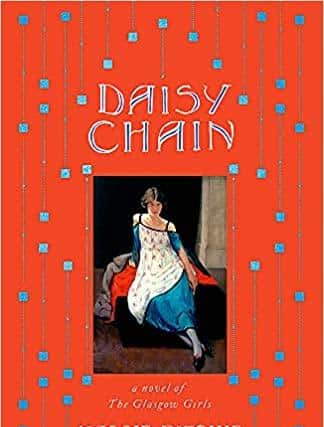Book review: Daisy Chain, by Maggie Ritchie


Daisy Chain is a wholly delightful novel. It was, Maggie Ritchie says, “inspired by the eventful lives of the artists known as the Glasgow Girls” who attended the Glasgow School of Art before the First World War. Actually, only Lily, one of the two principal characters, girls we first meet as children in Kirkcudbright, goes there and becomes a painter. The other, Jeannie, is a dancer. Their backgrounds or circumstances are very different. Lily is the doctor’s daughter, Jeannie the daughter of who knows who – she will flee from home in her early teens when her mother’s bidie-in attempts to rape her. She will then take refuge with an old gypsy dancer. The two girls will come together again only when Lily is studying at the Mack. Later, their wandering steps will take them to Shanghai in the 1920s, when Shanghai – a city of great wealth, abject poverty, high culture and criminality – bears much resemblance to Glasgow in its late 19th century heyday.
It’s a delightful novel partly because the author’s own delight in her creations is catching, partly because the evocation of both Glasgow and Shanghai – and also of the Galloway of their youth – is so well done. That evocation isn’t without a dark side. There is destruction as well as creation, violence and cruelty too. But essentially the novel rises above this because it celebrates friendship, love, kindness and devotion to creative work. In some ways it recalls Compton Mackenzie’s early Edwardian novels, with their picture of artists and artistic circles, the theatre and the music halls. Ritchie has something of Mackenzie’s pictorial sense; you can really see Lily’s paintings as she describes them, something of his zest for theatrical life. It’s in no sense pastiche, though like any novel set in the lifetime of the novel as an artform, it draws on our memories of period novels, engages with such novels, competes against them.
Advertisement
Hide AdIt’s not a clever novel, but it is an intelligent one. Cleverness in the novel is often pleasing, often entertaining, but also often arid. The clever novelists too often patronise their characters. The intelligent novelist never does that; he or she presents them with sympathy. Cleverness dissects; intelligence accepts and seeks to understand. The intelligent novel is always enriching. So Daisy Chain is a novel that asserts the worth of both friendship and the creative life, and it does so without sentimentalising its characters. It’s not perfect – almost no novel can reasonably be called perfect. Some of the dialogue is a little wooden, but dialogue in a novel set in the past is never easy. It is perhaps peculiarly difficult when the past that is being re-imagined is one in which so many novels were written. There are too many echoes and they are demanding ones. Ritchie rightly eschews pastiche, but sometimes, just sometimes, this results in a certain flatness. That said, the dialogue here almost always serves its purpose, which is sometimes as simple as just moving the narrative along.


Reading this novel I kept thinking how much my late and formidably well-read mother-in-law would have enjoyed it. She was a Glasgow girl of the next generation, brought up in the West End, a talented artist who might well have gone to the Glasgow School of Art, but instead opted for St Andrews University and English Literature, and only partly because St Andrews meant independence while, if she had gone to the Mack, she would have been expected to continue to live at home with Mother. So, like Ritchie’s Lily and Jeannie, she struck out for independence. She read widely all her life, everything from Shakespeare to Daphne du Maurier and Agatha Christie, while also being one of the fairly few people to have read Mackenzie’s Four Winds of Love from beginning to end. I suspect she would have read Daisy Chain straight through with deep enjoyment, and then gone back to the beginning to read it again more slowly, savouring the detail. And I guess that many who read it now will do just that themselves. I would also wager that it’s a novel that will fructify in memory.
Daisy Chain: A Novel of the Glasgow Girls, by Maggie Ritchie, Two Roads, 373pp, £16.99
A message from the Editor
Thank you for reading this article. We're more reliant on your support than ever as the shift in consumer habits brought about by coronavirus impacts our advertisers.
If you haven't already, please consider supporting our trusted, fact-checked journalism by taking out a digital subscription at https://www.scotsman.com/subscriptions